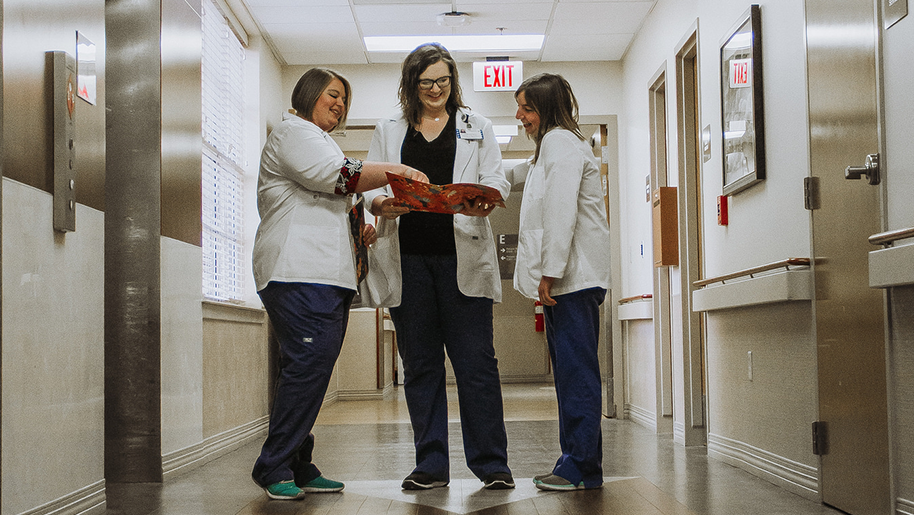Nutritional Sciences and Dietetics

Bachelor of Science in Nutritional Sciences and Dietetics
In Texas Tech University's Nutritional Sciences program, you will receive superior preparation to become a Registered Dietitian/Registered Dietitian Nutritionist (RD/RDN).
Didactic Program in Dietetics (DPD)
The Didactic Program in Dietetics at Texas Tech is approved by the Accreditation Council for Education in Nutrition and Dietetics (ACEND), Accreditation Council for Education in Nutrition and Dietetics of the Academy of Nutrition and Dietetics, 120 South Riverside Plaza, Suite 2190, Chicago, IL 60606-6995, (800) 877-1600 text 5400, http://www.eatright.org/ACEND. The curriculum is designed to achieve the core knowledge and competencies necessary to prepare graduates for an internship program or to pursue careers in the food, wellness and two, nutrition, or food service industry.
Our Nutritional Sciences Degree puts you on the fast track to professional registration.
Our Bachelor of Science in Nutritional Sciences and Dietetics degree program consistently has a placement rate in post-graduate internships nearly twice that of the national average. In addition, over 95 percent of our nutritional sciences graduates pass the national certification exam within a year of their first attempt.
Our Nutritional Sciences Degree program provides unique benefits such as:
- Laboratory experience. You can participate in research at Texas Tech's Nutrition and Metabolic Health Initiative (NMHI). A world leader in obesity research, this innovative facility provides specialized opportunities to learn about cutting-edge science in diet and nutrition.
- Practical training. Texas Tech's Nutritional Sciences program provides more opportunities for hands-on practice than most nutrition programs. You will interact with the community, registered dietitians, and individuals in hospitals, schools, clinics, and other real-world settings.
- A strong science foundation. Our nutrition program includes an especially strong scientific background, with courses in the biology and chemistry of healthy nutrition.
- An interdisciplinary approach. In our nutrition program, you will study the relationships among diet, physical health, and mental well-being. This unique approach improves your job readiness, as it covers the issues addressed by professional dietitians and nutritionists in their daily routine.
Students may also choose to get a Bachelor of Science in Nutrition. In this degree, they can choose one of two available tracks: Pre-Professional Health or Secondary Teacher Certification.
Our Nutritional Sciences & Dietetics (NSCD) Degree prepares you for post-graduate internships.
Our Didactic Program in Dietetics has a national reputation for excellence, which can help you gain admission to the best internship programs. In May 2020, our dietetics program had a 100 percent match rate for students with internships. The national average for dietetics internships typically hovers at about 60-70 percent.
Overview of the Degree
The Nutritional Science and Dietetics bachelor's degree is directed towards those wanting to become a Registered Dietitian Nutritionist (RDN) and has a strong focus in the sciences with support courses in chemistry, physiology, mathematics, food microbiology/sanitation and safety. Career courses include nutritional sciences, food science, biochemistry, physiology, foodservice systems management, medical nutrition therapy, and community nutrition.
The program is designed for students who have an interest in food, nutrition, and dietetics and enjoy working with people. Employment opportunities include positions in hospitals, clinics, community agencies, private consulting, long term care, extension services, food service operations, and corporate wellness or fitness centers.
Students who graduate with our degrees have to earn a C or better in all major and supporting coursework. Any variation from this is subject to departmental approval.
Career Opportunities in Nutritional Sciences and Dietetics
Society's trend toward good nutrition and health has produced a growing demand for dietitians and nutritionists. The Bureau of Labor Statistics projects a 21 percent growth in dietitian and nutritionist employment by 2022.
As a registered dietitian/registered dietitian nutritionist, you will find opportunities to work for many types of organizations, including:
- Hospitals
- Pharmaceutical companies
- Private practices
- Community and public health settings
- Long-term care facilities
- Food service companies
- Research areas
- Extension services
- Government agencies (WIC, AgriLife)
- Food and nutrition-related business and industries
- Sports nutrition and corporate wellness programs
Nutritional Sciences Courses:
Bachelor of Science in Nutritional Sciences Degree Plan:
DPD Admission Requirements and Application
Acceptance into the Didactic Program in Dietetics (DPD) at Texas Tech University is required prior to beginning upper level degree coursework. DPD Program acceptance is granted after completing 60 hours and is based on overall 2.8 GPA, an average of a 2.8 GPA in your first three NS courses and a minimum of a 2.0 GPA in the first three chemistry courses as well as human physiology. Transfers into this program must have a minimum GPA of 2.8 overall GPA. Once accepted into the DPD program, students are eligible to complete upper-level NS courses.
Verification Statement - Didactic Program in Dietetics
Upon completion of the undergraduate DPD coursework from an ACEND accredited program, such as the DPD Program at Texas Tech University, students will receive a Verification Statement of Completion. This document verifies that a student has completed the DPD requirements to apply for a position in a dietetic internship program (such as the post-baccalaureate internship offered at Texas Tech University) or to apply to take the national exam for Dietetic Technicians, Registered (DTR).
In order to obtain a DPD Verification Statement of Completion from the Texas Tech University ACEND accredited DPD program, students must meet all qualifications to obtain their bachelor's degree as well as achieve a grade of C or better in all DPD Coursework.
Becoming a Registered Dietitian
Graduates who successfully complete the ACEND-accredited DPD program at Texas Tech University are eligible to apply to an ACEND-accredited supervised practice program.
Most Dietetic Internship (DI) Programs select applicants for appointments through the Dietetic Internship Centralized Application Services (DICAS) portal https://portal.dicas.org/. The DICAS portal is where you will create and submit your internship application for most Dietetic Internships. DICAS applications can be submitted twice a year. Please refer to the DICAS website for more information on dates for application submission and notifications of appointments.
While applications are submitted through DICAS, the match process happens through a site called D&D Digital. For more information on the internship selection and matching process please visit: http://www.dnddigital.com or call 515-292-0490.
Dietetic Internships consist of a minimum of 1000 hours of supervised practice to gain the competencies needed to practice as an entry-level dietitian. Upon completion of the internship, graduates are eligible to take the CDR registration exam in order to gain the credentials of registered dietitian/registered dietitian nutritionist (RD/RDN).
*NOTE* Effective January 1, 2024, the Commission on Dietetic Registration (CDR) will require a minimum of a master's degree to be eligible to take the credentialing exam to become a registered dietitian nutritionist (RDN). In order to be approved for registration examination eligibility with a bachelor's degree, an individual must meet all eligibility requirements and be submitted into CDR's Registration Eligibility Processing System (REPS) before 12:00 midnight Central Time, December 31, 2023. For more information about this requirement visit the CDR website: https://www.cdrnet.org/graduatedegree. In addition, CDR requires that individuals complete coursework and supervised practice in program(s) accredited by the Accreditation Council for Education in Nutrition and Dietetics (ACEND).
In most states, graduates also must obtain licensure or certification to practice. For more information about state licensure requirements click here.
For more information about educational pathways to become a RDN click here.
Mission, Goals, and Objectives
The mission of the DPD Program is to prepare high-quality graduates for supervised practice leading to eligibility for the CDR credentialing exam to become a registered dietitian nutritionist by offering core knowledge and skills through quality education for the purpose of enhancing nutritional needs of society.
Goal 1: Graduates will be equipped in a timely manner for successful placement in supervised practice and/or admission into graduate school.
Objectives:
- At least 80% of program students complete the program/degree requirements within three (3) years (150% of the program length).
- At least 60% of program graduates apply for admission to a supervised practice program prior to or within 12 months of graduation.
- At least 60% of program graduates are admitted to a supervised practice program within 12 months of graduation.
- At least 80% of program graduates who apply to a supervised practice program within 12 months of graduation will be accepted.
- When surveyed, at least 80% of responding supervised practice program directors state they would accept another Texas Tech DPD graduate into their supervised practice program.
Goal 2: Graduates will be prepared to successfully complete supervised practice programs leading towards credentials as a registered dietitian nutritionist.
Objectives:
- The program's one-year pass rate (graduates who pass the registration exam within one year of first attempt) on the CDR credentialing exam for dietitian nutritionists is at least 80%.
- When surveyed, at least 80% of the responding supervised practice program directors agree that TTU graduates were prepared and able to perform the responsibilities of their supervised practice.
- When surveyed, at least 80% of the responding program graduates completing a supervised practice agree that the program prepared them well for supervised practice.
***Program outcomes data are available upon request.***
DPD Student Handbook:
The below DPD Student Handbook is a valuable tool with greater detail and additional resources to help you navigate your way through the NSCD Degree.
Academic Calendar:

For more information about the Bachelor of Science in Nutritional Sciences and Dietetics
Request Information Online
Request InfoContact Didactic Program in Dietetics (DPD) Director
Raul Palacios, M.S., RDN, LD
- Phone: (806) 834-6787
- Email: raul.palacios@ttu.edu
Contact the Office of Recruitment and Visitor’s Center
- Phone: (806) 742-1941
Nutritional Sciences
- Address
- Texas Tech University, P.O. Box 41270, Lubbock, TX 79409-1270
- Phone
Nutritional Sciences
-
Address
Texas Tech University, P.O. Box 41270, Lubbock, TX 79409-1270 -
Phone
806.742.5270 -
Email
hs.webmaster@ttu.edu


